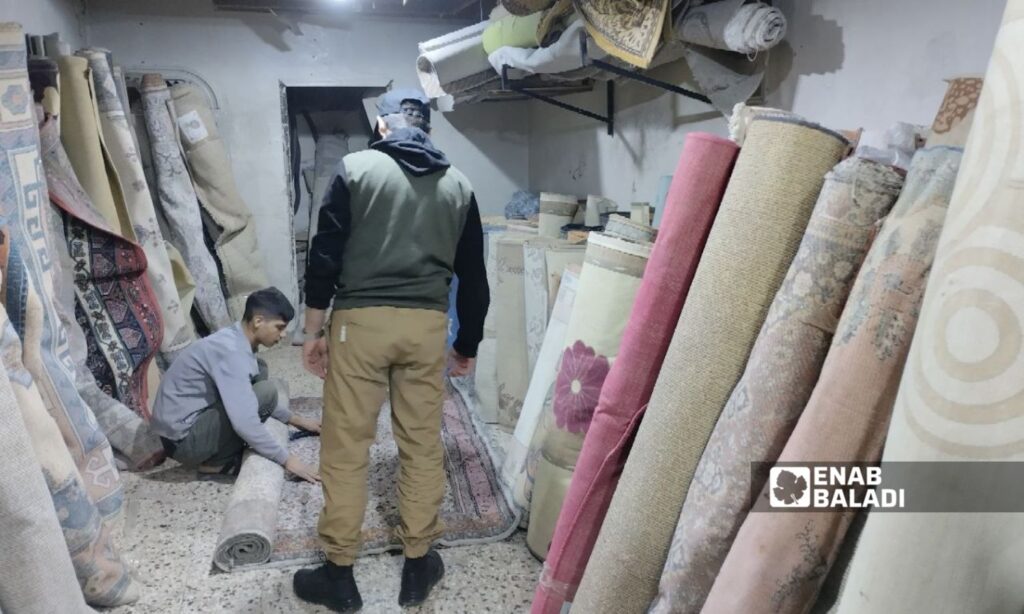Idlib – Samah Alloush
As winter approaches and temperatures drop, the demand for buying carpets in Idlib city, northwest Syria, rises. The second-hand market is considered the best option for residents due to its lower price compared to new products, which aligns with their increasingly worsening living conditions.
Families seek to secure the necessities that increase during the winter, especially heating supplies. The price of a ton of firewood has reached about $165, while a ton of chaff costs $175. The cost of filling a good-quality diesel barrel (220 liters) has reached $155, and these prices are unstable.
It is a customary habit within most Syrian homes to lay carpets in the sitting and sleeping rooms and sometimes even in the kitchen to ensure the entire house is warm.
With deteriorating living conditions and unemployment rates exceeding 88% among the population, buying new carpets has become a significant challenge for a large segment of the population, which numbers 5.1 million in the north, including two million in camps.
Used rugs or aid blankets
After searching through internet pages selling used items, Ms. Bushra Khaled bought a wool rug (six meters long) of good quality for 1,000 Turkish lira. Although one edge has a small burn, she finds it “better than others.”
The woman, who is a displaced person from the city of Saraqib and now lives in Idlib, stated that she left her furniture, including rugs, in her house before being displaced in 2019. She received a rug from an organization that distributed supplies to displaced families, but it was of poor quality, forcing her to buy one for her children’s room.
On the other hand, the thirty-year-old Amina is waiting for her financial situation to improve in order to buy a used carpet. For years, she has covered the floors of her rented home on the outskirts of Idlib with aid blankets to shield her family, displaced from Hama six years ago, from the cold.
She lives with her husband and two children in a rented, bare house, with only simple furniture obtained from a charity (blankets, mattresses, kitchen tools), stating that tight finances and her husband’s daily wage of 100 Turkish lira ($3) do not allow her to buy rugs.
Weak demand with predictions of an increase
Dozens of used carpet shops are spread across Idlib city, which have gained popularity over recent years.
According to vendors interviewed by Enab Baladi, there are no fixed prices in the used market; prices vary depending on the type of threads used, size, and cleanliness of the carpet. Many vendors offer discounts on remaining carpets of medium quality at lower prices to avoid losing sales.
Sources of merchandise vary between purchasing items from families wishing to change their home furnishings and suppliers from Turkey who obtained rugs and carpets from owners at reduced prices, which they sell in northern Syria.
Abo Abdo al-Hamawi, a displaced person from Hama residing in Idlib, has been working in the used rug trade for years, earning enough to support his living and pay rent.
The vendor told Enab Baladi that this year is different from previous years, as the influx of buyers remains less than in the same period of 2023.
Vendor Ali al-Saraqibi mentioned to Enab Baladi that a six-meter square rug is sold for 400 Turkish lira ($12), while smaller ones are priced at 300 Turkish lira.
He noted that there is demand for what is called a “doormat,” used at the entrances of bathrooms and kitchens, sold according to quality between 50 and 100 Turkish lira. He highlighted that vendors consider the customers’ financial situations, as those coming to buy used rugs are usually in critical financial conditions.
Vendors expect an increase in demand with the onset of rain and colder weather, as most families are forced to buy rugs when circumstances compel them, lacking the luxury to buy earlier.
During this time of year, laundry services in Idlib city become more active, with the cost of cleaning one meter of carpet around 10 Turkish lira, according to one laundry owner speaking to Enab Baladi.
This cost is relatively acceptable compared to cleaning them at home, especially amid water supply shortages in the city. Once displayed in shops, used carpets gather dust and dirt from the street, making them hard to clean manually at home.
New carpets are imported and expensive
Before the Syrian revolution in 2011, the wool carpets produced in Aleppo’s weaving factories were popular and sought after by families, known for their designs and colors, costing about 1,250 Syrian pounds per meter (approximately $25 at that time).
Currently, only used varieties of this kind are available in the markets. After Enab Baladi’s reporter toured the used carpet stores in Idlib, she found that the price of one meter, depending on quality and cleanliness, is around 1,000 Turkish lira ($30), which is high given the living conditions in northern Syria.
In another tour of specialized shops selling new rugs in Idlib city, prices vary based on the type of thread used in weaving, such as “poplin, acrylic, cotton, and polyester.”
Prices for new carpets start from 150 Turkish lira to 870 Turkish lira per meter, depending on thickness and type, with all kinds of new carpets currently sourced from Turkey and featuring colors and designs that were not common in Syrian society.
Vendors in Idlib confirmed to Enab Baladi that old Syrian products are no longer sold in the markets, due to a complete absence of mechanized factories or even handlooms in northern Syria.
For years, rugs and blankets have become a means of heating during the winter for a large segment of Syrians across various controlled areas. However, winter is particularly harsh on the tents of displaced persons, with suffering that renews every year.
Some families resort to primitive heating methods, such as burning shoes, plastics, and charcoal, despite the health issues these materials cause, including respiratory problems and fires.

